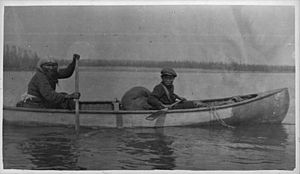Dene facts for kids
The Dene people are an Indigenous group of First Nations in Canada. They live in the northern boreal forests and Arctic regions. The Dene speak Northern Athabaskan languages. The word Dene means "people" in their language.
The term "Dene" is used in two main ways. Most often, it refers to Athabaskan speakers in Canada's Northwest Territories and Nunavut. This includes groups like the Chipewyan (Denesuline), Tlicho (Dogrib), Yellowknives (T'atsaot'ine), Slavey (Deh Gah Got'ine or Deh Cho), and Sahtu. Sometimes, "Dene" can also mean all Northern Athabaskan speakers. These groups live across Alaska and northern Canada. Southern Athabaskan speakers, like the Diné (Navajo) and Indé (Apache), use similar words for themselves.
Where the Dene Live
Dene people live across a very large area. You can find them in the Mackenzie Valley, which is south of the Inuvialuit lands. Their homeland stretches west into Yukon and the northern parts of British Columbia, Alberta, Saskatchewan, and Manitoba. It also reaches into Alaska and the southwestern United States.
The Dene were the first people to settle in what is now the Northwest Territories. Long ago, there were conflicts between the Dene and the Inuit in northern Canada. In 1996, leaders from both groups held a special ceremony. This helped them make peace after many years of disagreements.
Behchoko, Northwest Territories is the biggest Dene community in Canada.
Dene Groups
The Dene include several main groups. Here are five of them:
- Chipewyan (Denesuline): They live east of Great Slave Lake. The Sayisi Dene in Manitoba are part of this group.
- Tlicho (Dogrib): Their homes are between Great Slave Lake and Great Bear Lake.
- Yellowknives (T'atsaot'ine): They live north of Great Slave Lake.
- Slavey (Deh Gah Got'ine or Deh Cho): This group includes the North Slavey (Sahtu, Sahtúot’ine) along the Mackenzie River. The South Slavey live southwest of Great Slave Lake, reaching into Alberta and British Columbia.
- Sahtu (Sahtúot’ine): They live in the central Northwest Territories. This group includes the Locheux, Nahanni, and Bear Lake peoples.
Other groups also see themselves as Dene. These include:
- Tsuu T'ina (Sarcee): They live near Calgary, Alberta.
- Beaver people (Danezaa or Dunneza): They are from northeastern British Columbia and parts of northwestern Alberta.
- Tahltan, Kaska, and Sekani people: These groups live in the northern interior of British Columbia.
- Dakelh (Carrier) peoples: They live in the northern and central interior of British Columbia. The Wet'suwet'en are a subgroup of the Carrier.
- Tsilhqot'in people: They live in the Chilcotin District of British Columbia.
- Gwich'in and Tanana: These and other groups in Yukon and Alaska are also part of the Athabaskan-speaking family.
In 2005, Dene elders decided to join the Unrepresented Nations and Peoples Organisation (UNPO). They did this to gain recognition for their traditional lands and culture.
The largest group of Denesuline speakers lives in La Loche, Saskatchewan. This village and the nearby Clearwater River Dene Nation had 3,389 people in 2011. About 89% of them speak the Denesuline language.
Famous Dene People
- Thanadelthur (around 1697 – 1717): A Chipewyan woman who was a guide and interpreter. She helped make peace between the Chipewyan and the Cree people.
- Ethel Blondin-Andrew: A former Member of Parliament (MP) for the Western Arctic area in the Northwest Territories.
- Leela Gilday: A Canadian folk singer and Juno winner.
- Jimmy Herman (1940-2013): An actor who appeared in the movie Dances with Wolves.
- Matonabbee (around 1737–1782): A guide for Samuel Hearne's trip to the Coppermine River.
- Tahmoh Penikett: An actor known for Battlestar Galactica and Dollhouse.
- Eric Schweig: An actor who starred in The Last of the Mohicans.
- Jim Boucher: A well-known politician and businessman.
- Shannon Smallwood: A justice of the Supreme Court of the Northwest Territories.
- Be'sha Blondin: An elder and one of the founders of the Arctic Indigenous Wellness Foundation.
See also
 In Spanish: Dene para niños
In Spanish: Dene para niños
- Athabaskan languages
- Alaskan Athabaskans (Alaskan Dene, Tinneh)
- Navajo Nation (Diné)
- Apache people (Inde)
 | William M. Jackson |
 | Juan E. Gilbert |
 | Neil deGrasse Tyson |


